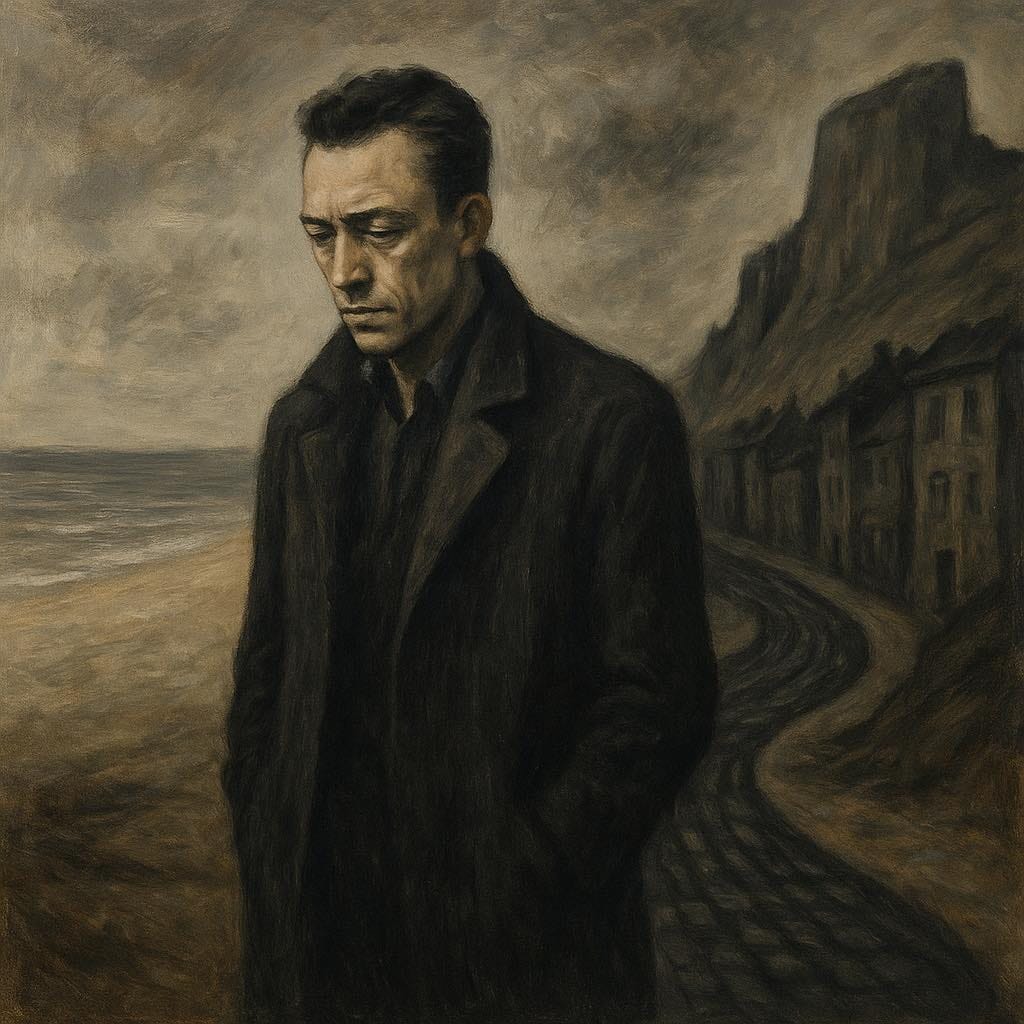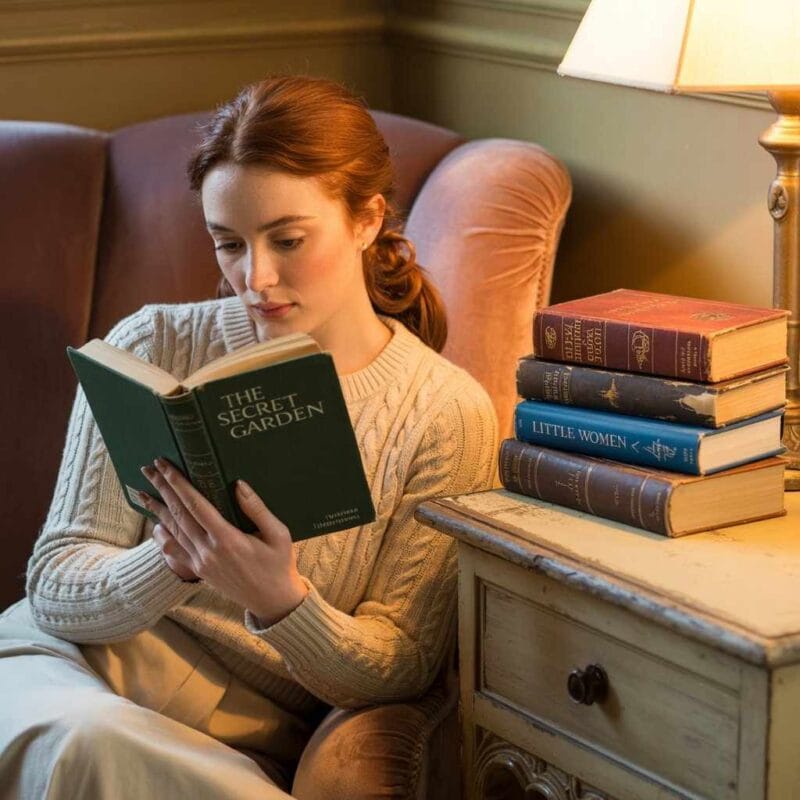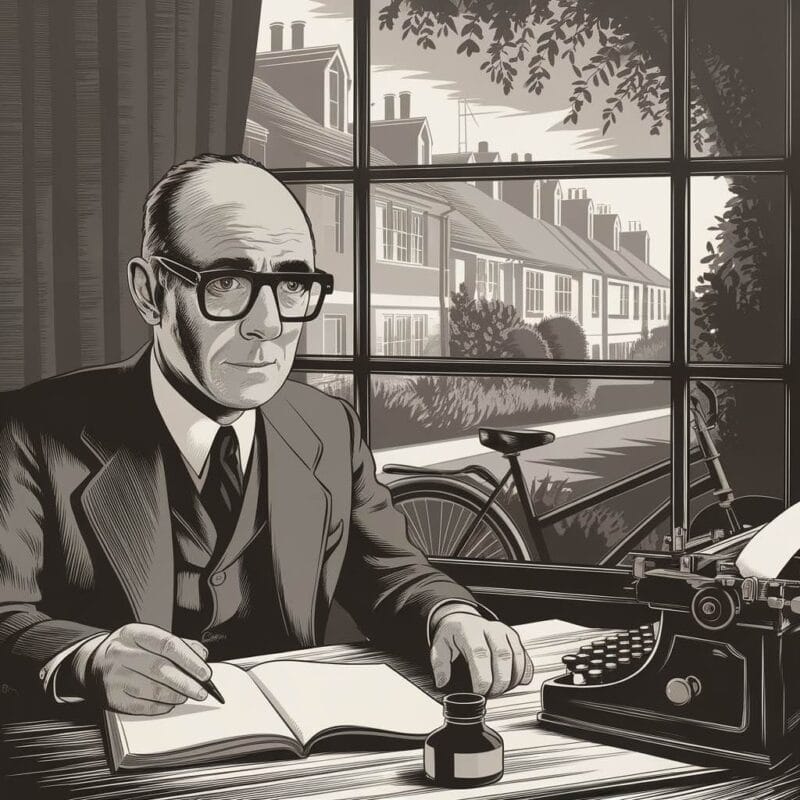Albert Camus stands as a penetrating moral voice of the twentieth century. He achieved this status by refusing to look away from the fundamental contradictions of life, rather than by offering solutions. He gave no easy answers, only questions that demand clarity and courage. In his fiction, the world is not a place for triumph or redemption, but a setting in which people confront indifference, mortality, and guilt—and act as if their choices still matter.
In The Stranger (L’Étranger, 1942), The Plague (La Peste, 1947), and The Fall (La Chute, 1956), Camus presents three distinct responses to this condition: detachment, resistance, and confession. Each book articulates a different voice, but all are bound by the same underlying concern: how to live without illusion. The lines that emerge from these works don’t console. They challenge. They expose the distance between belief and action, between what we claim to value and how we behave. And they linger because they name something most people instinctively feel but rarely admit.
The Peace of Lucidity in The Stranger
Since we’re all going to die, it’s obvious that when and how don’t matter.
The Stranger, trans. Matthew Ward (1988)
This quote distills Camus’s view of the absurd into a single line. Death is inevitable, and its timing offers no deeper meaning, no philosophical consolation or terror. What matters, in Camus’s view, is how we live in full recognition of that reality. Meursault, the protagonist of the novel, is often misread as apathetic; in truth, he’s radically present, stripped of pretense, fully aware. He accepts death on its own terms—without myth, without appeal—and that clarity becomes its own form of defiance.
Meursault’s rejection of conventional meaning confounds the world around him far more than the act at the center of the plot. While on trial for murder, what shocks the courtroom isn’t merely the crime but his refusal to perform grief, his emotional detachment, and his unwillingness to feign remorse. He doesn’t cry at his mother’s funeral. He doesn’t offer redemptive language to comfort the jury. His indifference is treated as a deeper offense than the killing itself. In refusing to pretend that life holds inherent moral order, Meursault exposes how much of society depends on shared illusions. His outlook on death, then, is not a rejection of life but a refusal to soften its finality.
I opened myself to the gentle indifference of the world.
The Stranger, trans. Matthew Ward (1988)
Meursault doesn’t rebel against meaninglessness. Instead, he surrenders to it. This line isn’t an emotional breakthrough but a philosophical acceptance. The world offers no consolation, and yet he finds a strange calm in that realization. Camus presents this not as nihilism, but as a form of freedom: the peace that comes when we stop expecting the universe to make sense.
This line arrives late in the novel, after Meursault has rejected religion, legal appeals, and the comforts people usually turn to when facing death. Rather than rage against the world’s indifference, he accepts it. For Camus, that acceptance is not despair, but lucidity. What makes Meursault’s clarity so disconcerting is that it stands without the usual supports: belief in moral order, emotional closure, divine justice. He sees the world as it is and finds peace. This tranquility derives from awareness independent of life’s purpose.
Resistance Without Illusion in The Plague
What’s true of all the evils in the world is true of plague as well. It helps men to rise above themselves.
The Plague, trans. Stuart Gilbert (1948)
Where The Stranger isolates the absurd within the individual, The Plague tests it against the collective. Camus’s narrator, Dr. Rieux, isn’t searching for cosmic purpose—he’s documenting a crisis. The plague arrives without reason, spreads without mercy, and punishes without distinction. Faced with this, Rieux refuses resignation. He takes action. This choice is grounded in the conviction that turning away would be a moral failure. Camus’s idea of revolt originates here. It is found in the basic act of refusing to abandon others, free from ideology or grandeur.
The quote frames suffering as a mechanism that reveals character, avoiding the suggestion that the experience is inherently ennobling. Rising above oneself isn’t about transformation into heroism; it’s about doing what decency requires, even when nothing promises a result. Camus’s resistance is clear-eyed and unsentimental. It has no illusions of triumph. When meaning is lost and only suffering remains, the stance one takes is what matters.
There’s no question of heroism in all this. It’s a matter of common decency. That’s an idea which may make some people smile, but the only means of fighting a plague is, common decency.
The Plague, trans. Stuart Gilbert (1948)
This line distills the moral spine of The Plague. Dr. Rieux doesn’t claim virtue or elevate his role but dismisses the idea of heroism altogether. What matters to him isn’t being remembered, admired, or even understood. It’s doing what the moment demands. Camus isn’t writing about sainthood or sacrifice but describing a form of ethical clarity that remains when everything else falls apart. Common decency, in this context, means taking responsibility without expectation of reward.
The phrase may sound modest, even flat, but in Camus’s moral vocabulary, that’s precisely its power. The strength of The Plague lies in its rejection of moral theatricality. When faced with anonymous death and institutional failure, decency emerges as the resolute counterpoint to despair. Rieux keeps going with the knowledge that turning away would make him complicit. In a world stripped of guarantees, The Plague asserts that decency is not a weak substitute for heroism; it’s what heroism looks like when stripped of illusion.
Guilt as Performance in The Fall
I used to advertise my loyalty and I don’t believe there is a single person I loved that I didn’t eventually betray.
The Fall, trans. Justin O’Brien (1956)
Jean-Baptiste Clamence speaks as a man who has fallen—not from grace, but from the illusion of moral certainty. Once a celebrated lawyer admired for his integrity, he now delivers a monologue in an Amsterdam bar to a silent stranger. Reflecting on the people he once claimed to love, he admits to betraying every one of them. What sounds like brutal honesty is central to his transformation: from someone who passed judgment to someone who now judges through confession. The Fall isn’t about a single moral failure but about the slow exposure of a life built on self-deception.
Clamence no longer believes in his own virtue, but rather than retreat, he adopts a new role: the “judge-penitent.” By confessing his betrayals, he disarms his listeners, simultaneously implicating them. His guilt becomes performance, his vulnerability a form of control. Through this character, Camus examines the disintegration of a carefully constructed identity, extending the analysis beyond a portrait of a man in crisis. Clamence doesn’t just fall; he stages the fall, turns it into theater, and compels others to recognize themselves in it.
Men are never convinced of your reasons, of your sincerity, of the seriousness of your sufferings, except by your death.
The Fall, trans. Justin O’Brien (1956)
Clamence delivers this line with the detachment of someone who has long abandoned the hope of being understood. He has come to believe that moral sincerity is impossible to prove while alive. Regardless of the intensity of truth or anguish, observers will inevitably suspect a hidden motive. This idea is devastating due to its familiarity, not its dramatic effect. Where appearances and posturing govern, even suffering becomes subject to doubt. According to Clamence, death is the only gesture that cannot be misread.
But the remark is also a tactic. Throughout The Fall, Clamence converts vulnerability into a kind of defense. He confesses everything to preempt judgment. He does not seek redemption, nor does he offer it. He narrates his descent into self-awareness as a final theatrical act. The city of Amsterdam becomes his purgatory, a place of fog, reflection, and endless monologue. The fall in Camus’s title is both the biblical echo of original guilt and a personal breakdown into permanent ambiguity. No absolutes remain; not innocence, not integrity, not even suffering. Only the echo of a voice, rehearsing its failures in a mirror no longer capable of giving answers.
###
Through these three novels, Camus gives us a progression: the stark awareness of The Stranger, the resolute revolt of The Plague, and the ironic unmasking of The Fall. Each offers a different way of confronting absurdity. None of them provides an answer, which is intentional. Camus doesn’t offer clarity so much as an ethical demand: look closely, act without illusions, and take responsibility—even when there’s no applause for doing so.
Further Reading
L’Étranger – stranger than fiction by Alice Kaplan, The Guardian
Camus’s Inoculation Against Hate by Laura Marris, The New York Times
What Albert Camus’ ‘The Fall’ Has To Say About Modern Society by Jacqueline Wallace, The Artifice
5 Essential Albert Camus Books: Classic Novels Everyone Should Read by Irrelevant Matters




